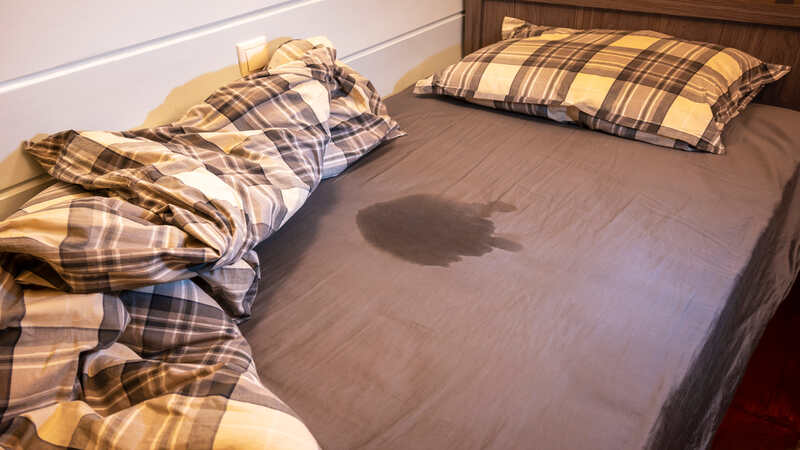
Bedwetting is a common problem in toddlers. Even after you start giving them toilet training, staying dry at night will take time to actually happen. At the age of 4.5 years, 30% of children still wet the bed more than twice a week, however the frequency of bedwetting decreases with successive years (1a). Hence you will need some help to control the bedwetting problems of your toddler.
Toilet training can be daunting but adventurous with lots of messes, successes, and challenges. But in spite of successful toilet training, toddlers may still wet their beds at night. Ever wonder why this happens? Here are the causes of bedwetting in toddlers and 7 proven steps to reduce it. So let’s dig deep into it.
In This Article
- What Causes Bedwetting in Kids?
- Steps to Control Your Toddler From Bedwetting
- Is my Toddler Wetting The Bed on Purpose?
- Are There Any Medicines For Bedwetting?
- Is Bedwetting a Serious Issue?
- When to Consult The Doctor?
- FAQ’s
What Causes Bedwetting in Kids?
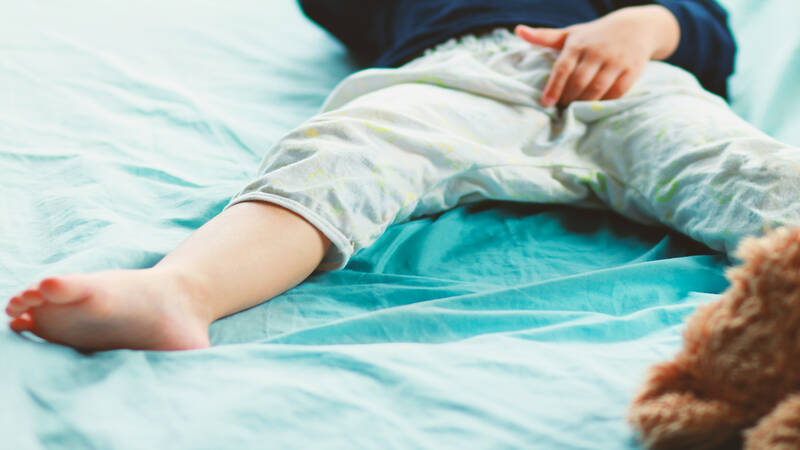
There can be multiple causes behind the bedwetting problems in toddlers. The main cause behind bedwetting in kids is their small and immature bladder and lack of control over it. Other possible causes can be-
- Constipation
- Fear or stress felt by the toddler during sleep
- Hormonal imbalance
- Family history of bedwetting in childhood
- ADHD or attention deficit hyperactivity disorder
- Childhood diabetes
Try to understand what is causing the bedwetting problem in your toddler. You can let your kid sleep with you if that comforts them for a good night’s sleep.
Steps to Control Bedwetting in Toddlers
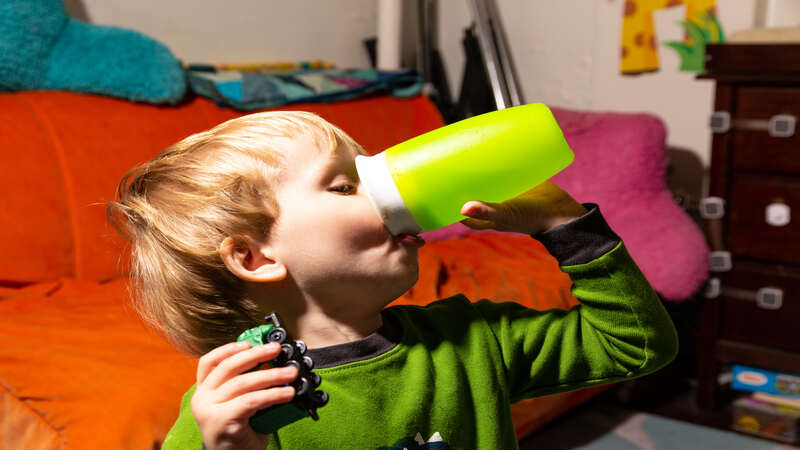
Many pediatricians suggest not worrying about bedwetting till age 7 years (1b). From the developmental perspective, children learn to control their bladder at different ages. Successful toilet training during the day will help grow and develop muscles necessary for success at nighttime. However, if you feel as though you and your toddler are truly ready to tackle bedwetting, here are a few tips-
Step 1. Rule Out Any Medical Conditions
Issues such as constipation, diabetes, or urinary tract infection can impact bedwetting. Diagnose the problem and go for its treatment.
Step 2. Create a Reward System For Remaining Dry
Creating a reward system for certain behaviors, like having a dry night can be very effective. But this will only be effective if there is some history of success, i.e. they are not wetting the bed every night. If they are wetting the bed regularly, hold off on implementing a reward. If kids do not earn the reward, it will become invaluable.
Step 3. Reduce The Nighttime Fluid Intake
Increase fluid intake earlier in the day and reduce it later in the day. It is recommended to maintain an adequate intake of fluid to eliminate or significantly minimize fluid intake before bedtime (2).
Step 4. Consistently Implement a Bedtime Routine
Turning off screens at least 1.5 hours before bedtime can improve sleep. Helping kids to remain calm and happy before bed will also help.
Step 5. Use Bedwetting Alarms
Consider the use of a wearable alarm to wake the child up if they start urinating while asleep. There are some pretty amazing products out there to assist with toilet training.
Step 6. Be Gentle With Your Toddler
Do not make your toddler feel guilty or bad about bedwetting, especially if toilet training is recent. Nighttime training typically occurs after they build muscle control from ‘holding it’ during the day and only eliminating it in the toilet.
Step 7. Consult a Specialist
Consider consulting a toilet training specialist if you feel so. You can take the help of professionals to build strategies for your toddler and the situation.
Is my Toddler Wetting The Bed on Purpose?
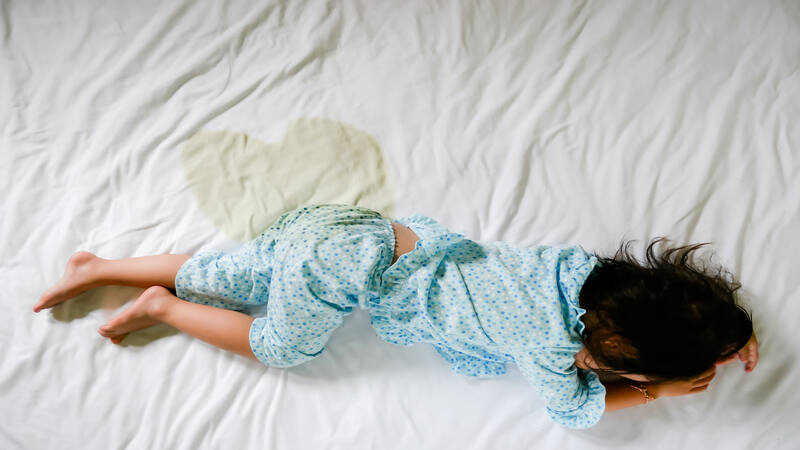
Your toddler sometimes may show the urgency to go to the toilet and sometimes they may do it right there. This may lead to your conception of whether they are bed-wetting on purpose.
No, that is not the case. Toddlers do not wet their beds on purpose and you must not scold them for that. Instead, treat the situation as normal but motivate and instruct your toddler to seek your help when they need to pee.
Are There Any Medicines For Bedwetting?

Desmopressin is mostly used to treat bedwetting in kids (3). But for toddlers, the dosage of the medicine, and its suitability needs to be decided by your pediatrician. Though there are medicines available in the market for bedwetting, you should not ideally use them for your toddler. Bedwetting will naturally resolve as your kid grows. You need to seek ways to successfully toilet-train your toddler. Medicines will only give a temporary remedy but you must aim for a permanent one.
Is Bedwetting a Serious Issue?
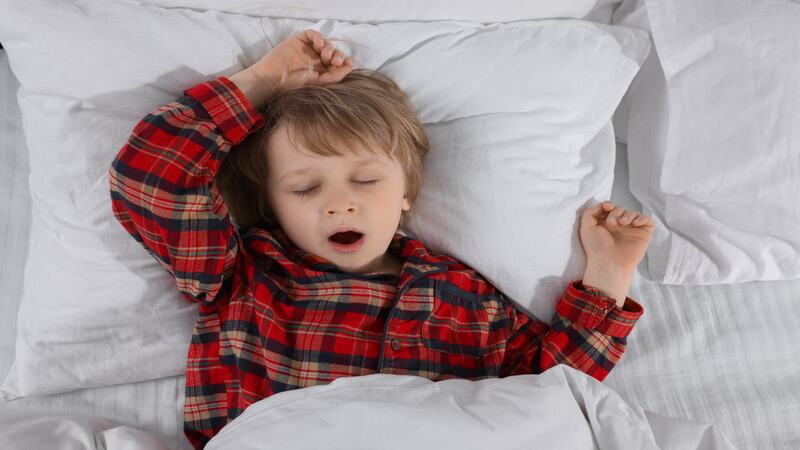
Bedwetting for a toddler is not a serious issue. Almost all toddlers wet their beds. The rate of bedwetting is higher in boys than in girls (4). This problem gradually decreases with time and proper toilet training. However, bedwetting can become a serious issue in certain cases such as-
- Urinary Tract Infections or UTIs- in case of any infection in the urinary tract the frequency of urination may increase (5). This may lead to bedwetting in toddlers. You can detect the problem by giving the urine sample of the toddler to a lab test.
- Sleep Apnea- Bedwetting can be a sign of sleep apnea (6). Notice if your toddler snores a lot during sleep and inform your pediatrician.
- Diabetes Mellitus- diabetes can also cause bedwetting problems in kids just like adults (7). Here also a urine sample test can detect the problem.
When to Consult The Doctor?

Though bedwetting is common in toddlers in certain cases it can indicate an underlying problem that requires medical attention. You can consult a doctor if you notice situations like-
- Frequent suffering from constipation
- Complaining about pain while urinating
- Urine contains blood
- Frequent anxious awakening at night
- Snoring at night
- The re-emergence of bedwetting after a gap of several months
- Having problems with urinary incontinence
Bedwetting in toddlers can be annoying as you will have to forego your sweet sleep to change their clothes and bedsheet. For a certain age, bedwetting is acceptable but you need to be conscious to recognize any hidden issues behind it. Follow the 7 steps to control the bedwetting problems of your toddler. And feel free to consult with your pediatrician if you suspect something serious.
FAQ’s
1. When Should You See The Pediatrician if Your Kid is Wetting The Bed?
You need to see a pediatrician for the bedwetting problem if your kid is fully potty trained but the problem reemerges after several months. You must visit the doctor if your kid is bedwetting even after 7 years.
2. At What Age is Bedwetting a Problem?
Bedwetting is a problem when the kid is more than 7 years old. Usually, most of the kids do stop bedwetting around 5 years of age hence you should be alarmed if bedwetting is still an issue even after 7 years.
References
- Nocturnal enuresis in children and young people: NICE clinical guideline – [https://www.ncbi.nlm.nih.gov/pmc/articles/PMC3080223/]
- Fluid and diet restriction for the management of bedwetting – [https://www.ncbi.nlm.nih.gov/books/NBK62715/]
- Desmopressin for nocturnal enuresis in children – [https://www.ncbi.nlm.nih.gov/pmc/articles/PMC8984681/]
- Nocturnal Enuresis – [https://www.sciencedirect.com/topics/agricultural-and-biological-sciences/nocturnal-enuresis]
- Urinary Tract Infections – [https://www.hopkinsmedicine.org/health/conditions-and-diseases/urinary-tract-infections]
- Nighttime Urination & Sleep Apnea – [https://www.sleepapnea.org/sleep-health/nighttime-urination-and-sleep-apnea/]
- Type 1 diabetes in children – [https://www.mayoclinic.org/diseases-conditions/type-1-diabetes-in-children/symptoms-causes/syc-20355306]

